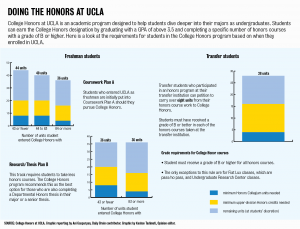University honors programs are known for offering rigorous coursework that requires students be fiercely dedicated to applying themselves academically. UCLA’s honors courses, however, aren’t just difficult to complete, they are difficult to get into.
College Honors is an academic program that caters to students committed to enriching their academic careers by taking on the extra workload of honors courses. Students who maintain a 3.5 GPA and complete a certain amount of honors courses with a grade of B or better earn an honors designation upon graduation.
Honors courses mainly consist of honors seminars and Honors Collegium courses. Honors seminars are one-unit additions to upper- or lower-division lecture courses and allow students to meet separately with professors to go over material outside the scope of the class that is still pertinent to the course. Honors Collegium courses are small seminars that cover current topics in various fields, and are taught by professors who are well-known in their respective fields of study.
Joining College Honors comes with more perks than just prestige. The College Honors department is relatively small, meaning students have more access to counselors to work out their academic needs. Students are also able have closer relationships with their professors and peers, which can be a great benefit to students pursuing graduate studies.
But these benefits come with several drawbacks. Fulfilling honors unit requirements can be difficult, especially for transfer students, because of the limited number of honors courses offered within certain departments. This quarter, for example, the English department is offering 21 honors courses, the history department is offering 12, the sociology department has eight and the gender studies department only has four.
This disparity can hinder students in different departments from taking part in the honors program. UCLA should accordingly urge departments with fewer honors courses to offer more and therefore make the program more accessible.
Students who can’t find an honors course in their department can get honors units by creating a contract course. Honors contracts are one-unit adjuncts that students can add to courses they’re already enrolled in. Consequently, these students have to do additional work compared to their peers not in honors, such as submitting substantial research reports. Students can do up to four contracts throughout their time in the honors program, and professors are permitted to partake in up to seven contracts per quarter.
Hannah Hsieh, a third-year philosophy student, said she hasn’t seen a lot of honors seminars offered within her major. She added that almost none of the classes in her department fulfilled honors requirements unless the professor made it an honors seminar.
“I’m lucky because in my department all of the professors (I approached) are willing to do that,” Hsieh said. “But I’m sure there are a lot (in other departments) who wouldn’t.”
Just completing honors contracts isn’t enough to fulfill the honors requirements, however. Students still need to take honors seminar courses, which have small class sizes and thus fill up quickly. Increasing these classes sizes, while a seemingly viable option, would detract from the more intimate learning environment small class sizes create.
Rana Jamil, a third-year psychology student, said there are very few honors seminars she can fit into her schedule because the psychology department offers a limited number of honors courses. She said this is one of the reasons she has fallen behind in completing the honors requirements on time.
“Most of the classes I am taking are out of obligation and not because I’m interested in them,” Jamil said.
The limited honors courses within certain departments means some students are required to take classes outside of their majors to fulfill the requirements. While some may enjoy taking a more diverse set of classes, it is unreasonable to ask transfer students and upperclassmen, who have already explored different departments in their first two years of college, to continue doing so in their limited time at UCLA – especially when some may seek to specialize in certain fields of study through honors courses.
Stanley Schein, a UCLA psychology professor who teaches Honors Collegium courses, said he thinks if professors utilized the many resources offered at UCLA, they could create more honors classes. He added that he thinks College Honors should encourage professors to offer more honors courses.
“Instead of advertising that you want Fiat Lux classes, advertise you want professors to use courses in a creative matter that doesn’t cost too much effort,” he said.
He added another issue for professors creating honors courses is that departments have certain curriculum requirements, meaning professors might not get teaching credit if they create an extra course in the major.
“You have to figure out how to teach the course so your department recognizes it as contributing to their major,” Schein said.
Some might argue that students should be encouraged to take courses in departments outside of their own to complete honors courses. After all, UCLA is meant to offer an interdisciplinary education. However, the honors program is meant to offer students a more intensive understanding of subjects already taught in lectures, and students should have more options to take courses relevant to their fields of study.
Offering more honors courses within departments will allow for more students to be able to complete the program and do an in-depth study of their major. Students should not have to stress about how they’re going to fit honors units into their already hectic schedules.
The purpose of an honors program is challenging oneself academically, but these challenges should be limited to inside the classroom, not how to get into it.

